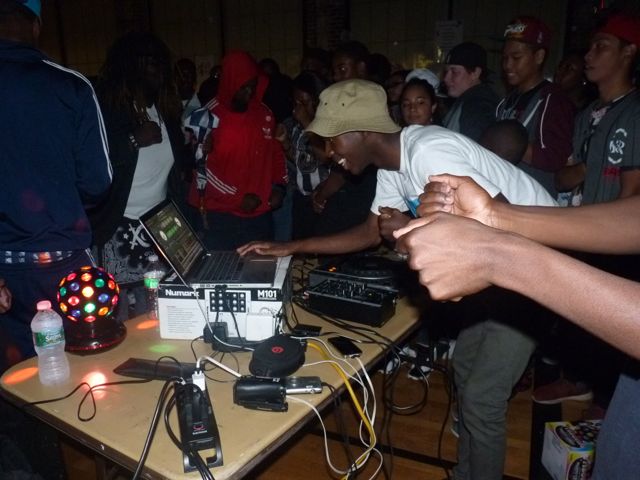
Elizabeth spoke in the Perspectives of Women in the Military conferencein March. Photo by Moriah Santana
by Moriah Santana
A Pentagon study released April 29 showed a 50 percent increase in reports of rape and sexual assault among active-duty servicemembers.
White House and Department of Defense officials said the increase in reporting is seen as victims becoming more comfortable with reporting assaults.
New York Sen. Kirsten E. Gillibrand, however, said the study was a “troubling look at sexual assault in the military.”
“The Pentagon said that of the 5,061 reported cases, 484 went to trial and 376 resulted in convictions,” Gillibrand said. “[The numbers] should send chills down peoples spines, because less than one of 10 reported cases proceeded to trial.”
Sexual violence within the military impacts both men and women. According to a Virginia national screening program, about 1-in-4 women and 1-in-100 men report sexual assault during military service.
“In a 12-month period beginning in June 2012, members of the U.S. Armed Forces were 15 times more likely to be sexually assaulted — and report it — than to be killed by an enemy,” Drake Reed reported in the Indiana Daily Student News.
According to the DOD 2012 annual fiscal report, “fewer than 15 percent of military sexual assault victims report the matter to a military authority.”
The U.S. Senate rejected on March 6 the Military Justice Improvement Act, sponsored by Gillibrand, which would have moved the decision whether to “prosecute any crime punishable by one year or more in confinement [away from commanding officers] to independent, trained, professional military prosecutors,” according to Gillibrand’s website.
Gillibrand’s bill was drafted in response to the hesitation that victims often have about reporting the crimes against them because of the bias and conflicts of interests within the military chain of command when it comes to deciding whether a case will move forward to trial, according to gillibrand.senate.gov.
Twenty-five percent of women and 27 percent of men who received unwanted sexual contact said the offender was someone in their military chain of command, according to Gillibrand’s website.
Financial Literacy teacher Michael Prout, who serves as a sergeant of the Army Reserve in Pennsylvania, said the bill seemed like a “good idea.”
“It was probably denied by some because some high-ranking officers … don’t want any of their authority taken away from them,” Prout said.
In opposition to Gillibrand’s proposal, Missouri Sen. Claire McCaskill sponsored a bill that would allow alleged victims to choose whether commanders or military prosecutors would investigate an incident. Supporters of McCaskill’s measure argue that if military commanders can’t prosecute these cases, they will not have full control of their troops.
“In certain cases it may be necessary to remove the case from the commanding officer,” Prout said. “[The commanding officer] may not feel comfortable because they may feel that they are the one that is breaking down the cohesion in the unit, when it is actually the perpetrator of the sexual assault that breaks down any camaraderie in the unit.”
Senior Stanley Maina, who is training to be an aviation mechanic for the New Jersey Army National Guard, said the cases should be handed to a proper judge and jury.
“Say a really good soldier is accused of sexual assault, a commanding officer wouldn’t be as tough and observant as a regular judge would be,” Maina said.
Maina believes the military “throws [rape cases] under the table.”
“They pretend like it didn’t happen,” Maina said. “If you get caught, you get court martial, but [sexual assault] is such a sensitive thing, and they don’t talk about it too much.”
Former New York Army National Guard track vehicle mechanic Jennifer Hogg said in an interview with The Student Voice that she felt safe within her unit because she didn’t drink during her service from 2000-2005 in Buffalo, NY.
“I think most people in general feel safe until something happens,” Hogg said. “You can take steps like watching how you drink, watching your surroundings, etc.”
Hogg is a co-founder of the Service Women’s Action Network, “a group of women getting together and giving more organized support” to survivors of sexual assault.
New Jersey National Guard finance management specialist Bryn Elizabeth, a graduate student majoring in cyber and corporate security at New Jersey City University, said she maintains a “professional bearing at all times” to secure her safety while on active duty in Somerset, NJ.
“I do not flirt or act open to any sexual invitations or advances,” Elizabeth said. “I do not sexually fraternize with my co-workers. Not drinking greatly reduces the risk of sexual assault, as the majority of incidents involve alcohol. However, eliminating alcohol wouldn’t guarantee there wouldn’t be rape.”
Prout said he has a “zero tolerance” for sexual assault.
“I also let the guys know that I have a zero tolerance for that stuff, and I will personally see to it that they get brought up on [Uniform Code of Military Justice] charges,” Prout said. “The ladies are supposed to be your sisters in the fight, and anything romantic must be of mutual consent.”
Each army unit has a Sexual Harassment/Assault Response and Prevention representative who is a non-commissioned officer trained to handle any incidents that occur, according to Elizabeth.
A soldier who decides to speak to his or her SHARP representative has two options: a restricted report, which is an anonymous way to file a complaint without starting an investigation but still entitles a soldier to medical treatment, or an unrestricted report, which initiates a full investigation into the incident.
“If found guilty the male or female being accused will be demoted, kicked out of the Army or perhaps even serve jail time through the Uniform Code of Military Justice, or the military’s legal system,” Elizabeth said.
Sexual violence and harassment are heavily associated with multiple mental health conditions for men and women veterans. Sexual assault is the leading cause of post-traumatic stress disorder among women veterans, with combat trauma still the leading cause of PTSD among men, according to an article on the Service Women’s Action Network.
Rape victims are “three times more likely than non-victims to have ever had a major depressive episode and have had higher rates than non victims of substance abuse,” according to Dean G. Kilpatrick, the director of the National Crime Victims Research and Treatment Center.
Prout said sexual assault in the military continues to be a problem, although it isn’t as bad as it used to be.
“The reason why sexual assault is still an issue is because the military is still a male-dominated ‘macho’ culture,” Prout said. “Unfortunately, women are looked at more as a sex object than an equal.”
Hogg said one of the most important things for a female to do before joining the military is to get informed.
“Make sure this is the decision you want to make,” Hogg said. “You have to be informed of what military life is actually like. Before you get in, find out what the avenues of what you should do are, if something should happen.”
Senior Shad’ae Waiters, who is planning to study nursing at Valley Forge Military College, said she is going to be “aware of the things she needs to know and the things she has to do to protect herself.”
“I’m going to be wise, be mindful of the things around me,” Waiters said. “I’m going to be observant. These are important matters that shouldn’t be bypassed.”




